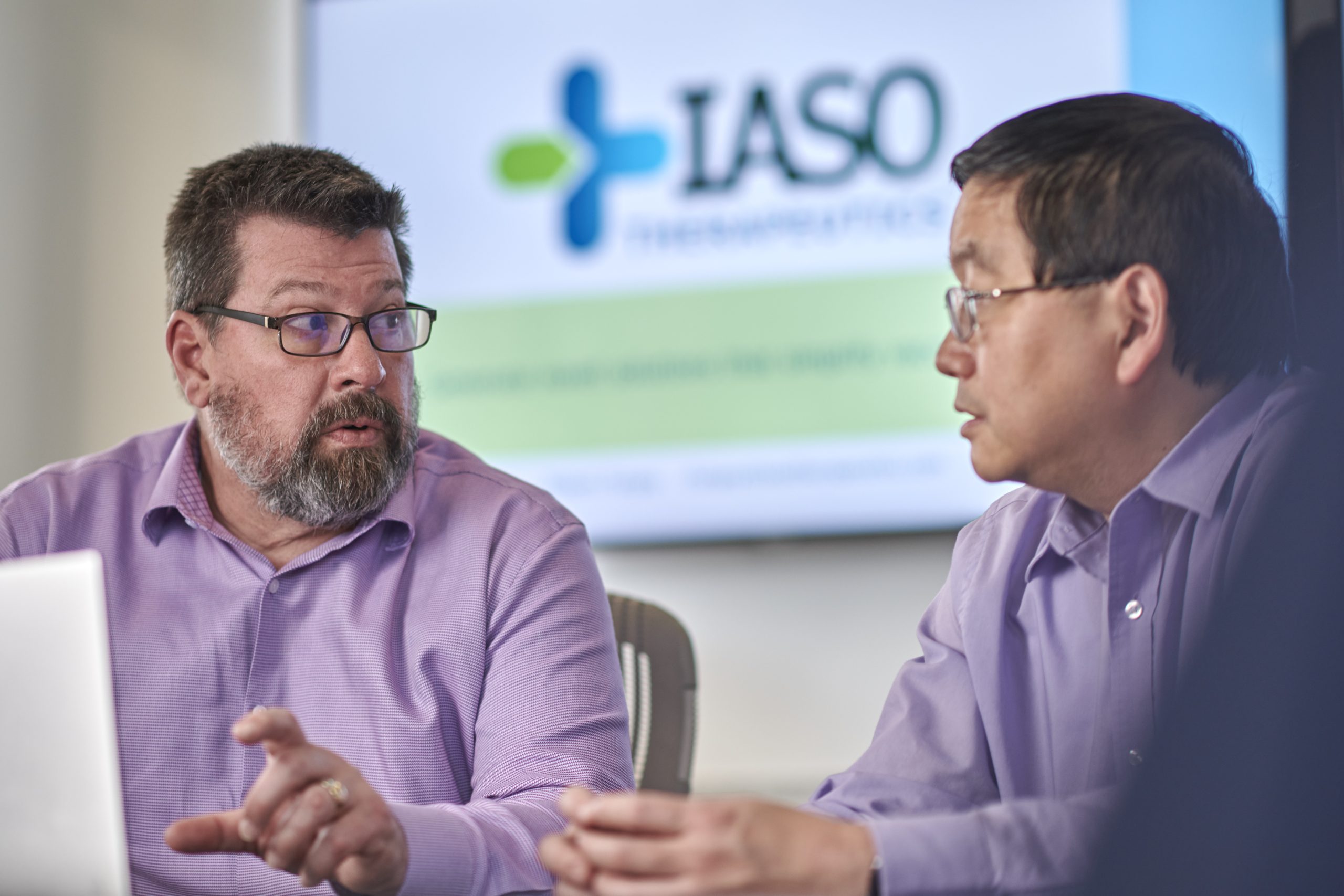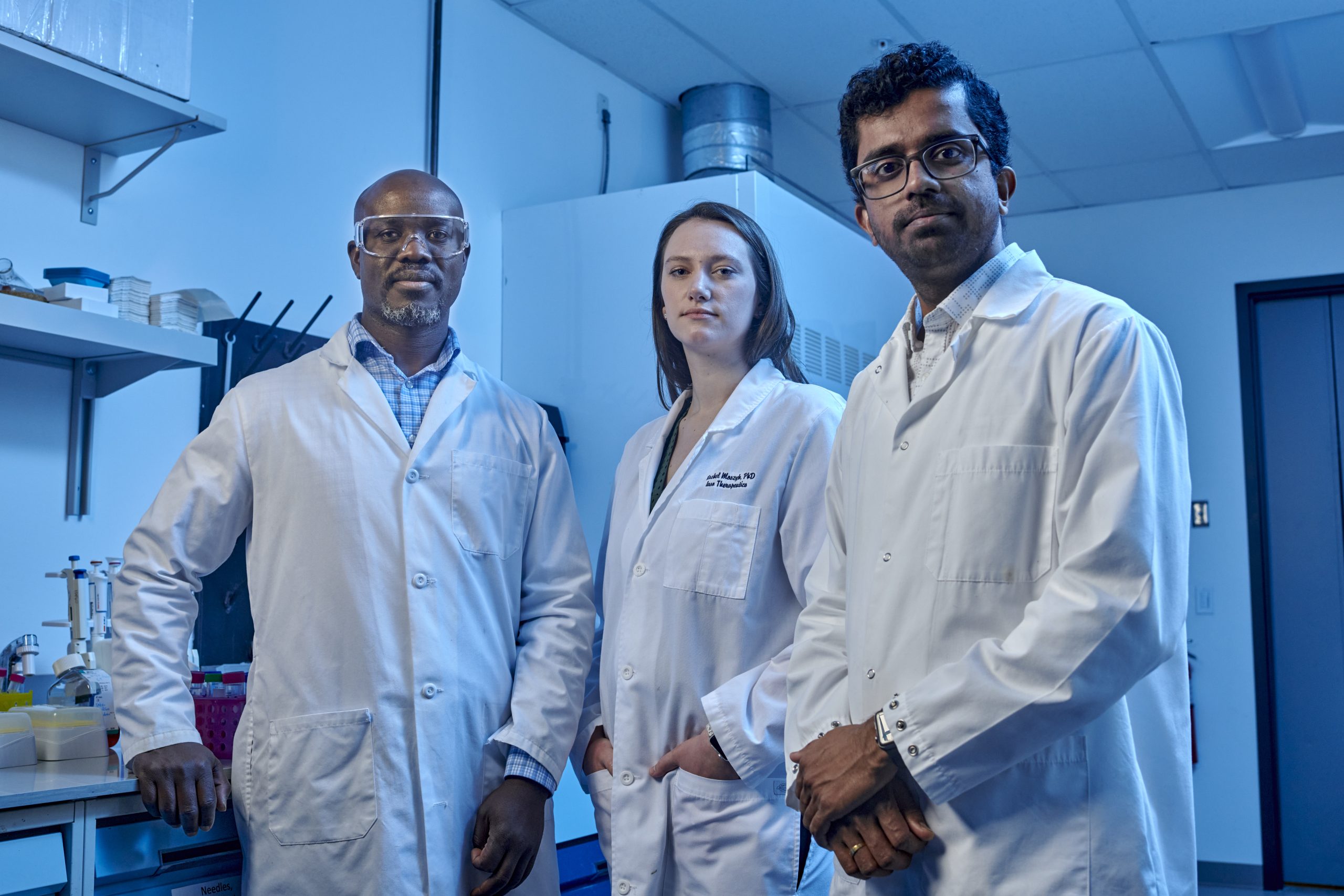A soccer ball-shaped, nanoparticle-sized vaccine delivery platform called Q-Beta might hold the key to unlocking treatments for any number of viruses and diseases—from cancers to infections and even opioid addiction—thanks to the work of a research team that got its start at Michigan State University (MSU).
This groundbreaking research is currently being done by Dr. Xuefei Huang, a professor in MSU’s Departments of Biomedical Engineering and Chemistry, along with a team of collaborators to develop the East Lansing-based startup company Iaso Therapeutics.
After decades of laboratory research and development, Dr. Huang recognized the need to bridge the gap between translating his discoveries in MSU labs into products that make life better in the real world.
With assistance from the combined efforts of MSU Technologies (MSUT) and the MSU Research Foundation, Dr. Huang launched Iaso Therapeutics to continue the landmark research into the Q-Beta antigen delivery platform, a product that has the opportunity to save thousands of lives.
Vaccine Platform’s ‘Secret Sauce’ Enables it to Fight Many Unrelated Diseases
Since 1965, MSU has made headlines with its breakthrough cancer research, notably with the development of two drugs: cisplatin and its derivative carboplatin, coined “the penicillin of cancer drugs” due to their widespread efficacy.
 Dr. Huang sees his team following in the footsteps of those MSU pioneers with his Q Beta delivery platform. This time it’s not a drug, but rather a vehicle for the delivery of sophisticated vaccine technology to achieve widespread inoculation and eradication of any number of diseases.
Dr. Huang sees his team following in the footsteps of those MSU pioneers with his Q Beta delivery platform. This time it’s not a drug, but rather a vehicle for the delivery of sophisticated vaccine technology to achieve widespread inoculation and eradication of any number of diseases.
“Cisplatin and carboplatin are a huge MSU success story; a lot of lives have been saved,” says Dr. Huang. “We want to develop the next cisplatin—and that takes a lot of support from the campus.”
The global community at large has watched the latest advancements in vaccine technology with the recent development of Messenger RNA vaccines during the COVID-19 pandemic. Still, Dr. Huang believes there is room for improvement to this technology.
“The mRNA vaccines were a rapid way to create an immune response to a disease, but the problem with those vaccines is they don’t have memory, so you constantly have to go in and get boosters,” says Frank Urban, director of Life Sciences at the MSU Research Foundation, who initially encouraged Dr. Huang to start his company. “The Q Beta delivery platform provides an opportunity to give immunity to the same pathogens as the mRNA vaccines, but it has an extremely powerful memory component to it so that it can work either separately or in conjunction with the mRNA vaccines to provide almost a lifetime immunity to a disease,” says Urban. Dr. Huang’s discovery stems from his extensive work investigating the carbohydrates that exist on human and bacterial cell surfaces. Eventually, his work led to the discovery of the applications of Q Beta, the soccer-ball-shaped bacteriophage that can be used to train immune systems to recognize uniquely bad carbohydrates (such as those associated with certain cancers, for example) and trigger a person’s immune system to kill cells with those particular carbohydrate markers.
 Q Beta’s “secret sauce” lies in its high surface density and ordered pattern of conjugation sites, making it uniquely effective in stimulating the body’s Helper T cells. Q Beta’s combination of pattern and density allows for it to provide a greater number of target antigens to the body’s immune system, eliciting a greater immune response. A higher duration, higher intensity, longer lasting immune system response is key to helping the body develop an immune response “memory” that can help provide a lifetime immunity to a particular disease.
Q Beta’s “secret sauce” lies in its high surface density and ordered pattern of conjugation sites, making it uniquely effective in stimulating the body’s Helper T cells. Q Beta’s combination of pattern and density allows for it to provide a greater number of target antigens to the body’s immune system, eliciting a greater immune response. A higher duration, higher intensity, longer lasting immune system response is key to helping the body develop an immune response “memory” that can help provide a lifetime immunity to a particular disease.
It’s also quite versatile. “It’s like a car—what you put in the car is up to us,” says Dr. Huang. “It’s really good at transporting things, so we can put in different antigens, cancer antigens, microbial antigens. We did a head-to-head comparison, and Q Beta is superior to other delivery platforms. We have a better car.”
In addition to potential therapies for cancer or infectious diseases, or even maladies like arthritis, Dr. Huang says it might also have novel uses in the field of addiction therapy, as well. Laboratory mice injected with a lookalike opioid delivered by Q Beta made high levels of antibodies against opioids, making them less susceptible to the “high” upon future exposure, he says.
Another advantage of Q Beta is its potential to provide more equitable vaccine access for patients around the globe.
Originally from Kenya, Iaso Therapeutics Chief Scientist Herbert Kavunja studied as a postdoctoral student under Dr. Huang and was later recruited to join Iaso Therapeutics as its first employee. The issue of vaccine access in developing parts of the world is critically important to him.
“One of the limitations is that many vaccines require refrigeration. Look at the mRNA vaccine for COVID—you read that thousands of doses had to be thrown away or they went bad before they could reach people in need,” says Kavunja. “What if we had a technology that did not require liquid nitrogen or refrigeration? Our technology has the potential to solve those issues. Our vision is to make sure that this technology is going to make vaccine access easy.”
MSU Partners Help Faculty-Entrepreneurs Change Lives with Breakthrough Research
The road to creating this new vaccine delivery platform was paved by many hands.
MSU Technologies secured a patent for Q Beta in the U.S., as well as in other key countries, such as Canada, China, Japan, Hong Kong, as well as in Europe, and also provided support for Dr. Huang to secure translational grants which helped fund promising research to get the technology ready for commercialization.
“Worldwide patent protection is essential for generating investment in the development of the products because it takes an incredible amount of money to get through the regulatory hurdles and do everything needed in the various countries in order to get the approval for the product. And no company wants to make that investment without the ability to keep others out of their sandbox,” said Anne Di Sante, Executive Director of MSU Technologies.
Despite the early apparent promise of Q Beta, however, there was some initial reluctance from the established pharmaceutical companies to invest in the technology at such an early stage.
 “There had been so much litigation and uncertainty that many companies were not investing in it, but Pharma now has a very different tolerance for taking on the risks of academic technology,” Di Sante said. Di Sante went on to explain how MSUT partners closely with the MSU Research Foundation to help de-risk new technologies through the various translational grant opportunities that help further develop technologies and prepare to transition them into viable startup companies, which helps make them more appealing to future investors.
“There had been so much litigation and uncertainty that many companies were not investing in it, but Pharma now has a very different tolerance for taking on the risks of academic technology,” Di Sante said. Di Sante went on to explain how MSUT partners closely with the MSU Research Foundation to help de-risk new technologies through the various translational grant opportunities that help further develop technologies and prepare to transition them into viable startup companies, which helps make them more appealing to future investors.
Early-stage grant programs like the Michigan Translational Research and Commercialization (MTRAC) Program and ADVANCE grants which are co-sponsored by the Michigan Economic Development Corporation (MEDC), and funding from MSU’s Targeted Support Grant for Technology Development (TSGTD) program provided critical early funding that helped move Q Beta from the lab into the new startup: Iaso Therapeutics.
From Idea to Startup Company
Once the decision was made to launch Iaso Therapeutics based on the Q Beta technology, the MSU Research Foundation stepped in to help provide additional resources to assist the budding startup, including helping Iaso secure funding through programs such as the Emerging Technologies Fund (ETF), Small Business Innovation Research (SBIR), and Small Business Technology Transfer (STTR) grants.
The MSU Research Foundation connected Iaso to additional funding opportunities through its Red Cedar Ventures and Michigan Rise venture funds, as well as the opportunity to lease lab space at its VanCamp Incubator located in East Lansing, where the development of Q Beta could continue.
The MSU Research Foundation also supported Iaso by providing training assistance, access to teams of legal and accounting experts, as well as providing access to mentorship programs to help faculty transition into a startup mindset. Support also included help from the Entrepreneur in Residence (EIR) program, which introduced Robert Forgey—who is now president and CEO of Iaso Therapeutics.
The EIR program was created to bridge the knowledge gap between faculty inventors and successful startup founders by offering guidance from business professionals with entrepreneurial experience who can provide expertise in developing the plan and securing funding from grants or investors needed to launch a successful startup.
“We aspire to develop a technology to the point where it has clinical proof of concept in humans or in animals,” says Forgey.
At press time, one of the top five pharma companies had reached out to Iaso Therapeutics to explore using Iaso’s Q Beta platform as a delivery system for the pharmaceutical company’s favorite antigen. This Sponsored Research Agreement has the potential of leading to a licensing agreement using Q Beta with that company’s new vaccines.
Dr. Huang says that armed with strong pre-clinical data from the laboratory; the next steps are to work through the process of taking Q Beta through human clinical trials to ensure safety. That process will take an estimated $7 to $10 million.
Forgey says he’s confident in the company’s future, especially with the backing of MSU. From MSUT providing intellectual property protection, investment to secure international patents, and assistance with translational funding to the MSU Research Foundation working with Iaso to help them secure early funding through a successful Phase 2 SBIR grant as well as providing Iaso with access to talent and programs to ensure the fledgling startup the best chance of success.
“Michigan State University has evolved over the past 20 years to have the best entrepreneurial support in the state of Michigan and possibly in the United States. The breadth and depth of support that they provide is well thought-out, well-reasoned, and they seem to anticipate when you’re going to need help, and they’ve got a solution there for you,” he says. “I have the greatest belief that we are going to change vaccines in multiple ways.”
###
About the MSU Innovation Center:
The MSU Innovation Center is dedicated to fostering innovation, research commercialization, and entrepreneurial activities from the research and discovery happening across our campus every day. We act as the primary interface for researchers aiming to see their research applied to solving real-world problems and making the world a better place to live. We aim to empower faculty, researchers, and students within our community of scholars by providing them with the knowledge, skills, and opportunities to bring their discoveries to the forefront. Through strategic collaborations with the private sector, we aim to amplify the impact of faculty research and drive economic growth while positively impacting society. We foster mutually beneficial, long-term relationships with the private sector through corporate-sponsored research collaborations, technology licensing discussions, and support for faculty entrepreneurs to support the establishment of startup companies.
Is your company interested in collaborating with MSU faculty on the next life-saving vaccine? Click Here.

